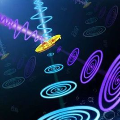Machine Learning (ML) models are trained using historical data to classify new, unseen data. However, traditional computing resources often struggle to handle the immense amount of data, commonly known as Big Data, within a reasonable time frame. Quantum Computing (QC) provides a novel approach to information processing, offering the potential to process classical data exponentially faster than classical computing through quantum algorithms. By mapping Quantum Machine Learning (QML) algorithms into the quantum mechanical domain, we can potentially achieve exponential improvements in data processing speed, reduced resource requirements, and enhanced accuracy and efficiency. In this article, we delve into both the QC and ML fields, exploring the interplay of ideas between them, as well as the current capabilities and limitations of hardware. We investigate the history of quantum computing, examine existing QML algorithms, and present a simplified procedure for setting up simulations of QML algorithms, making it accessible and understandable for readers. Furthermore, we conduct simulations on a dataset using both traditional machine learning and quantum machine learning approaches. We then compare their respective performances by utilizing a quantum simulator.
翻译:暂无翻译




